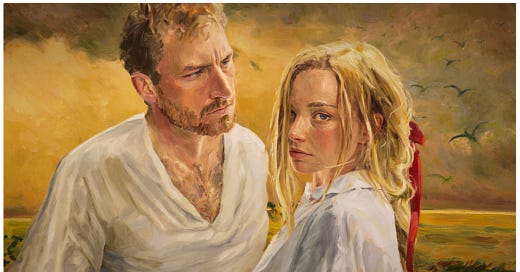The Peasants
This Polish drama from the makers of "Loving Vincent" uses painted animation to startling effect in an engrossing tale of agrarian lust, greed and betrayal.
In 2017 “Loving Vincent” garnered a lot of attention — and an Academy Award nomination — for its use of painted animation to tell the story of famed artist Vincent van Gogh. The filmmakers shot the movie with live actors and then animators hand-painted over the imagery to create a vivid, surreal mix of live action and art.
I admired its look but felt the storytelling just wasn’t there. Given the narrative weakness, the approach to animation felt less innovative and more a gimmick.
Now the husband-and-wife writing/directing team, DK Welchman and Hugh Welchman, are back with another film that uses the same technique but has a tragic and engrossing story to tell. Based on the massive four-volume work by Polish novelist Władysław Reymont — which won the Nobel Prize — “The Peasants” is an ambitious and emotionally vibrant tale of agrarian lust, greed and betrayal.
Rather than existing for its own sake, the animation underscores and enhances the story and characters, making them seem even more alive and immediate. In addition to shooting with live actors, the filmmakers also created shots based on actual paintings by mostly Polish artists from around the same time setting as the story, late 19th/early 20th century.
Set in the remote farming village of Lipce, the film centers on Jagna, a young woman of marriageable age played by Kamila Urzędowska. Beautiful and willful, she prefers living with her widowed mother (Ewa Kasprzyk), doing her share of the farming work and ignoring talk of marriage. She is lusted after by a great portion of the local menfolk, whose loose tongues and idle boasts have left the false impression she has dallied with many of them.
The one man whose gaze she does return is Antek (Robert Gulaczyk), a slightly older man who already has a wife and children. Antek is hot-blooded and brooding, with much of his foul mood attributable to his father, Boryna (Mirosław Baka), the community’s “first farmer,” aka the man who owns the most cultivated acreage.
Recently widowed himself, Boryna has resisted local tradition and law in refusing to split up some of his land amongst his children. Despite being the eldest son, Antek is essentially trapped as his father’s servant. Antek and Jagna’s flirtations grow more serious with time, with talk of running away together.
Everyone is surprised when the elder Boryna decides to “send vodka” to Jagna — the local custom for when a man makes clear to everyone he intends to court and wed an eligible woman. Jagna’s mother thinks she is doing right by her daughter in negotiating some of Boryna’s prime acreage into the marriage contract. Jagna herself is horrified at the prospect of marrying someone decades her senior, but in this day and age the woman is more or less a barterable commodity.
As the seasons turn, the situation becomes more and more tense. Jagna’s marriage is the height of the little community’s social calendar, but whispers continue to grow about her laying with Antek and other men. The gossip is led by the two most prominent local women, the mayor’s wife (Sonia Bohosiewicz) and organist’s wife (Małgorzata Kożuchowska), despite having been previously friendly with Jagna.
Complicating things, a new minor nobleman has purchased Wolf’s Hollow, the nearby woods where the villagers have long enjoyed rights for hunting and timber, setting up a feudal showdown.
The land itself is practically a character in its own right, a representation of the holy compact the farmers have with the earth that sustains them. Those who own land have status and standing, and everyone else is seen as beneath them. Boryna’s family squabble over his acres like wolves over a fresh kill, including Antek’s long-suffering wife, Hanka (Sonia Mietielica).
“Love comes and goes, but land stays,” is the farmers’ adage.
There are many visually breathtaking scenes in “The Peasants,” from Jagna’s kinetic wedding party — the joyful dancing contrasted with her resigned sadness — to a terrifying battle in the forest. Even superficially happy occasions contain notes of malevolence, like a winter festival in which revelers dress up in vaguely menacing animal costumes.
The acting is uniformly splendid, with Urzędowska and Gulaczyk the standouts as the star-crossed lovers. Their relationship seems at times beautiful and genuine, and at other points spiteful and corrupt. As a powerless woman, Jagna must constantly navigate a treacherous terrain of suspicion and resentment, an object of both covetousness and scorn.
“The Peasants” is a very beautiful film, but one of human weakness and small-mindedness. It’s a reminder that art is often at its best in capturing our worst.





